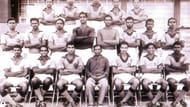
One day, Mohammed Yousuf Khan sat in the sun and trembled. A schoolboy who was passing by stopped to enquire about his trembling hands. With the directness of the young, he asked, "Didn't you do some physical exercise when you were young?" The boy hadn't noticed the words "Arjuna Award" on the nameplate. The boy didn't know that in 1962 India beat South Korea to win its Asian Games football gold medal. The boy hadn't read that only two men from that team made it to the Asian All Star XI.
In his tiny three-room house in Hyderabad, where the ceiling was an asbestos sheet and dust powdered every surface, in one corner stood two cupboards, repositories of his worth as a man: chipped medals, rusting cups, frayed clippings. He did not have much else left. He remembered days when he couldn't repair his shoes because he could not afford a cobbler. The pension was used to placate his morbidity and to support his family.
Cricketers in Hyderabad had been allotted government land in upmarket areas like Banjara Hills. Mohammed Yousuf Khan, the footballer, his slipper affixed together with a safety pin, unable to afford a cinema ticket, had been allotted humiliation. Said the old man with a saddening charm, "I am ashamed to talk about how I meet my expenses."
That day when the boy asked him whether he'd ever done physical exercise, Khan replied, "Yes, I played football." Said the boy, "You should have played cricket."
One wonders whether he truly should have, as he undeniably embraced death’s bed on 1st July, 2006.
Nowadays, everyone who follows football in India has a vague idea about how India were not allowed to play the 1950 FIFA World Cup in Brazil as they were going to play barefoot. But a lot of theories have arisen over the years like the AIFF (All India Football Federation) didn’t let India participate in the event because they couldn’t afford sending the players to Brazil, though the organisers offered to pay most of the expenses to get India to Brazil. One can only imagine, had India played in that World Cup, what an impetus it could have been for Indian football for many more years to come.
However, hardly any Indian born in the 21st century has any clue about the fact that glorious years of Indian football spanned for a decade-and-a-half starting from the London Olympics of 1948 to the 1962 Asian Games in Indonesia. Had India made that trip to Brazil in 1950, things would have been a lot different. As Sailen Manna, who would have been the captain of that team, once sadly said, “Indian football would have been on a different level had we made that journey,” and aptly so.
Had the Government or the sport authorities taken the right steps in the recognition of the successes, the unfair treatment of our esteemed athletes would never have been witnessed, and an unfortunate story of a fighter like Yousuf Khan’s could have been avoided.
